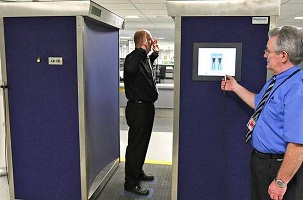After testing full-body scanners at Delhi’s Indira Gandhi International Airport (IGIA) for three years, the Central Industrial Security Force (CISF) has said that the security system is not foolproof. A full-body scanner checks a person for concealed metal objects and weapons. During the last trial in December 2016, the CISF, which handles security at the IGIA, raised concerns about the machine not being able to adapt to the Indian way of dressing and giving false alarms whenever a woman wearing a sari passed through it.
The scanner also found it difficult to detect objects concealed in footwear.
It is not a foolproof security system,” said Hemendra Singh, Assistant Inspector General (AIG) and CISF spokesperson. After the report on the scanners, it was decided that we will continue with the existing security system under which passengers pass through a Door Frame Metal Detector and are then frisked with a hand-held metal detector, said Mr. Singh.
Giving details about the other security measures implemented at the airport, Mr. Singh said: “We have introduced an express security facility for passengers with hand baggage. We are also putting special emphasis on passenger-friendly screening of the differently-abled. We are also focusing on passenger profiling and behaviour detection as a tool for aviation security.” “The non-core jobs at airports will be outsourced to private security guards to increase the presence of CISF men at other important locations,” he added. Mr. Singh said that the full body scanner system could facilitate ‘smart flyers’ who know what security frisking at airports entails, and therefore would never conceal a metal object knowingly or unknowingly.








